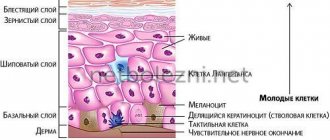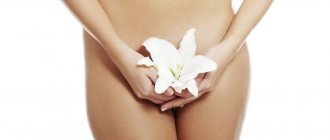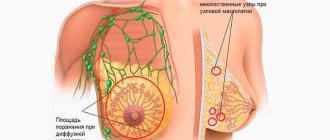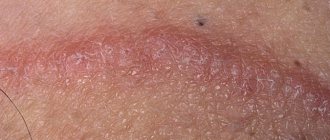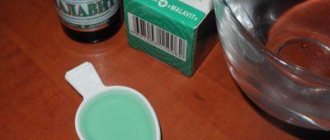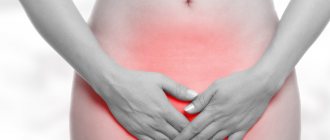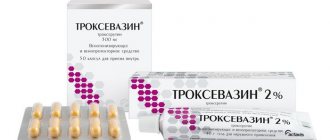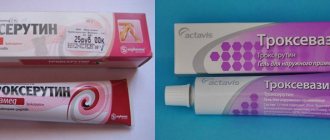Vaginal dysbiosis: causes of development
Bacterial vaginosis, or vaginal dysbiosis, is a gynecological ailment that occurs quite often in women.
In a healthy woman, more than 95% of lactobacilli are present in the intimate area. They prevent the proliferation of pathogenic microorganisms and maintain the correct acid balance. Vaginal dysbiosis is caused by hormonal disorders, improper hygiene, frequent changes of sexual partners, long-term antibiotic therapy, and incorrectly selected contraceptives. To prevent irritation and dryness in the intimate area, you should definitely use soap or gel for intimate hygiene. Reviews from experts indicate that such products contain only “soft” surfactants that help maintain and restore microflora.
https://youtu.be/jVpkgpq3rHM
Useful properties of intimate gel
Let's take a closer look at the benefits of the gel for female intimate hygiene:
- Gently removes dirt. The gel for the genitals contains a very small amount of surfactants that do not wash away the natural flora, but gently remove impurities.
- Maintains neutral or slightly acidic pH. This is not your average alkaline soap. The acidity of the detergent for feminine hygiene is neutral. Accordingly, the pH of the mucous membrane is not disturbed, and beneficial lactobacilli do not disappear anywhere.
- Protects against infections. Of course, no gel will help with promiscuous sex life. But sometimes vaginitis and candidiasis occur due to hypothermia and wearing synthetic underwear. This is due to the death of the beneficial microflora of the genital organs. Gel for intimate areas often contains lactobacilli, which are the guardians of women's health. They do not allow E. coli and yeast, which live in small quantities on the mucous membrane of the vagina and labia, to multiply.
- Removes odor. Unlike regular soap, gel for intimate areas does not muffle the odor or make it stronger. After use, the ingredients contained in the product remove pathogenic microorganisms that cause the odor.
- Soothes the skin. Often in the summer, after using panty liners and synthetic panties, the skin in the intimate area sweats. This may cause irritation and redness. Medicinal herbs in the product and lactic acid relieve irritation and inflammation.
Using classic soap, including baby soap, will not give the same effect as using a special product for the delicate area. This is due to the composition of the intimate gel, which includes the following beneficial properties:
- Gentle cleansing. The active components of the solution act gently, without destroying absolutely all compounds, including beneficial microflora cells;
- Maintaining a natural acid-base balance, which is very important for the normal condition of the genital mucosa. Jumps in pH in the direction of decreasing acidity provoke the development of pathological reactions, as conditions become favorable for the development of bacteria;
- Eliminates unpleasant odor and prevents its further occurrence. This property is achieved with the help of special fragrances and compounds that block the growth of bacteria that cause odors;
- Calming effect. The composition of the gels contains herbal extracts or elements that help relieve inflammation and irritation in the intimate area. What is often observed in sensitive skin as a result of a reaction to the use of pads and underwear;
- Antibacterial effect that protects against infection. The gel preserves beneficial microflora, supplemented with lactobacilli. This helps the mucous membrane cope with a variety of pathogens, naturally, if their number is moderate and they do not belong to the groups of serious pathological microorganisms and fungi.
Red line - soap for intimate hygiene
Today it offers eight types of soap for intimate hygiene. In fact, this is the most ordinary liquid soap, with a standard composition for such a product. Only one type of soap contains lactic acid, the rest contain herbal extracts. The manufacturer does not provide information about the pH level of the product, so we can assume that it is at the standard level for liquid soap - about 7.
Pros of Red Line soap
The main advantage of this product is its affordable price, about 90 rubles. It is no worse than any other liquid soap, so it is often used for washing. Many women note the pleasant aroma of the detergent, while other brands of intimate soap have virtually no smell.
Cons of soap Red line
This product cannot be called soap for intimate hygiene in the full meaning of the word. It does not destroy the microflora of the genital organs as much as, for example, economic, but it also does not have a positive effect on its development. Unlike expensive intimate products, it contains perfume fragrances. Most users have given this soap more neutral ratings than positive ones.
Although the manufacturer indicates that the product is hypoallergenic, some women complain of discomfort after using it.
Most users note that this soap is a little thin and it takes up much more than more concentrated and thick products. Therefore, despite the low cost, it cannot be called economical. Red Line intimate hygiene soap is not the worst option, but not the best either.
A delicate question: what is special about intimate gels and how to choose the right one?
Once in a store, a person can easily get lost among the huge selection. You need to give preference to the product that best meets your current needs. It all depends on the problems and characteristics of the delicate areas.
Cleansing
This is the most common group of intimate care products. Every girl will be able to choose a suitable product in any price category. The most popular intimate hygiene cleansers include:
- Gel Intimate from the Nivea brand. It does not contain alkaline soap or dyes, but contains lactic acid and chamomile extract. However, it does have a slight, delicate scent. Therefore, it is worth doing an allergy test.
- Gel Lactacid. It is usually sold in pharmacies or specialty cosmetics stores. It contains lactic acid and whey. The texture is soft and creamy.
- Gel Vagisil. It has a natural pH. Its advantage is the presence of glycerin, lactic acid, chamomile and aloe extracts. The gel perfectly relieves dryness, moisturizes and does not cause irritation.
- Delicate foam Pleyana. The product does not provoke allergies and is very gentle on the skin.
Antibacterial
Such products should not be used on an ongoing basis. Antibacterial products for intimate hygiene should be used exclusively in unique cases, for example, after sex, during menstruation, as well as in the treatment of dysbacteriosis and thrush. Similar gels include:
- Foam "Epigen Intim". Lactic and glycyrrhizic acids in the composition fight harmful bacteria.
- Cleanic gel, enriched with calendula extract, prevents the proliferation of pathogenic flora.
- Gel Green Pharmacy. Produced in Belarus. Antibacterial properties are obtained from tea tree essential oil. In addition, it has provitamin B5, which perfectly moisturizes delicate skin.
- TianDe gel has a natural composition. Its pH is neutral and it also has antibacterial qualities.
- Gel NanoCare Intime. It prevents the proliferation of harmful bacteria thanks to chlorhexidine in the composition, and panthenol moisturizes the skin.
Products for constant use should be chosen as safe as possible. The most effective are:
- Gel Carefree Sensitive. This is a very delicate product. It is especially suitable for delicate skin that is sensitive to chemicals. It needs to be whipped into a light foam. The consumption is very economical.
- SebaMed gel. He sells mainly in pharmacies. Its advantage is its low pH level of 3.8. This is as close as possible to the natural microflora, especially in young girls. Its advantages are the presence of panthenol, betaine, and virginia nut extract.
- Gel Cora. Thanks to the presence of anti-irritation components, oils and extracts. it moisturizes delicate skin and does not disturb the natural pH. The product does not provoke irritation or allergic reactions.
- Foam Organic Zone. The texture is very pleasant and does not cause an allergic reaction.
- Mousse Denis Ozornin from Grim Mama. An excellent product for daily intimate hygiene because it contains lactic acid and does not contain alkaline soap.
Expert opinion
Tatyana Somoilova
Cosmetology expert
As for gaskets, as mentioned above, they cannot be used constantly. But in some cases it is still necessary. In this case, it is worth choosing those that do not have fragrances, dyes and chemical additives. And the surface should be as soft as possible.
Moisturizing
In some cases, a woman needs additional hydration in the intimate area. This may be due to a certain period of menopause or during menopause. Therefore, the following moisturizers for intimate hygiene are suitable:
- Gel Sesderma Intim. It contains hyaluronic acid and panthenol, burdock extract. Therefore, it helps keep the skin of intimate areas elastic and soft longer, and prevents it from drying out.
- Gel Saugella Polygin. It has an acidity pH of 7. Plus it contains chamomile extract. All this helps to normalize the microflora during menopause in women and eliminate dryness in delicate areas.
Refreshing
On the road or at work, when it is not possible to clean yourself up with plain water, you can use refreshing intimate hygiene products. Usually these are napkins. They refresh and prevent the development of pathogenic flora. The most popular are:
- Femfresh;
- Aura beauty;
- Premium Classic “Lactic Acid”;
- Lactacid.
Sensitive “The Little Mermaid” mousse, which contains lotus hydrosol, also gives you a feeling of freshness. The product has a pronounced aroma.
From the smell
In some cases, women can use special deodorizing products. But they are not suitable for girls, as they provoke poor personal hygiene. Intimate hygiene products for odor remove the natural aroma, but also have their own. Effective are:
- Gel Femfresh. The product does not have its own aroma, does not interrupt the smell, does not cause irritation, and is suitable for everyday use.
- Femfresh deodorant spray. Suitable for use when it is not possible to use a shower or shower, that is, for traveling or long movements.
It is impossible to single out which product is the best. Gel for intimate care is selected depending on the preferences and health status of the woman.
Representatives of the fair sex with frequent relapses of candidiasis and colpitis should give preference to products with lactic acid and moisturizing components. They not only cleanse the genitals well, but also prevent the mucous membrane from drying out. Dryness of the external genitalia is often associated with menopause and the use of hormonal contraceptives. This causes discomfort and can lead to infection with E. coli or fungi.
List of the most popular moisturizing gels for intimate hygiene:
- Oroni. This product is made in Poland. It contains lactic acid, D-panthenol and chamomile extract. The gel not only has a moisturizing and softening effect. It helps wounds and damage after shaving and hair removal to heal faster. There are Oroni gels that contain tea tree extract. This remedy is recommended for women with chronic candidiasis. Tea tree oil is known for its antibacterial and antifungal properties. Sold in large economical bottles of 500 ml. The cost of the package is $3.
- Lactacid femina. Contains lactic acid. The product does not contain soap, so it does not change the acidity of the external genitalia. The product is produced in European countries in compliance with all established quality standards. It is practically odorless, but eliminates unpleasant odors. Foams easily and rinses off quickly, leaving no film or unpleasant sensations. The product is hypoallergenic and tested by dermatologists. The price for a 200 ml bottle with a dispenser is $3.
- Phytomedics, Siberian Health. Available remedy. The packaging is inconvenient; the gel is sold in tubes with a lid that snaps on. The composition does not contain lactulose, but contains extracts of patchouli, tea tree, string, sage and chamomile. Sodium lauryl sulfate is present, which can dry out the skin and mucous membranes. The cost of a 200 ml tube is only 1.5 dollars.
- DeoIntim. This is a Swiss product that contains extracts of wheat, witch hazel, tocopherol and vitamin E. The substance perfectly deodorizes and moisturizes. Does not contain lactic acid, therefore suitable for women intolerant to lactulose. The product contains wheat germ oil, which prevents the intimate area from drying out. The cost of a 125 ml bottle is $10.
- Vagisan. This remedy is often recommended by gynecologists, as it contains lactic acid, extracts from calendula and chamomile. Does not cause burning or itching. Helps normalize vaginal microflora when taking antibiotics. Does not dry out the mucous membrane. Recommended for use after childbirth and during menstruation. The cost of a 250 ml bottle is $5.
Cleansers for intimate hygiene differ from moisturizers by the presence of a large number of surfactants and antibacterial components. They are recommended to be used if you are in constant motion throughout the day. It is also advisable to use such substances during menstruation. They gently and quickly remove dirt and residual waste.
List of popular cleansers for intimate hygiene:
- Kefri. The gel contains many extracts of medicinal herbs and aloe. No lactic acid. The product, despite the absence of surfactants, foams well and is quickly washed off. Outperforms competitors due to price and elusive pleasant smell. Excellent deodorizer and does not cause irritation. The price for a 200 ml bottle is $2.
- Epigen. The composition of the product is ambiguous. Contains surfactants and sodium lauryl sulfate. The manufacturer took care to normalize the pH and introduced lactic acid into the product. But, in addition, the composition contains phytosphingosines and glyceric acid. These components are derived from licorice root. They help not only cleanse the skin of impurities, but also fight pathogenic microorganisms. The color of the gel is yellow and the consistency is very thick. It only takes one drop to carry out hygiene procedures. The price of a 250 ml bottle is $15.
- Uryazh. Contains lactic acid, thermal water and a special Glyco-Gin complex that gently cleanses. The bottle is not very convenient, since there is no dispenser, it resembles a tube. The bottle contains 200 ml and costs $15.
- Liren. Cleanser with deodorizing effect. Suitable for sensitive and irritated skin. Contains lactic acid, licorice root and Betaine, which prevents the mucous membranes from drying out. The cost of the product for 300 ml is 4-5 dollars.
- Green pharmacy. Affordable soap for genital hygiene. The composition contains tea tree oil and a mild soap composition. The product is aimed at cleansing and eliminating burning. Tea tree is an antiseptic that kills fungi and opportunistic microorganisms. Convenient packaging with dispenser. The cost of 370 ml of product is 1-2 dollars.
- MALIZIA-MIRATO. Polish product for washing intimate areas. The product contains calendula extract and aloe vera. Perfectly cleanses the skin and prevents the accumulation of secretions in the skin folds. The cost of a 200 ml bottle is $3.
- Tiande. An effective gel containing antibacterial components. They kill opportunistic microorganisms and help cope with irritation. Contains silver ions, which have an antibacterial effect. The manufacturer added lactic acid, chamomile and sage extract to the substance. When used correctly, it does not destroy beneficial microflora. The price of a 360 ml bottle is $5.
- Nivea. A budget option for everyday use. Contains lactic acid and chamomile extract. Cleanses perfectly and does not dry out the skin. A 200 ml bottle costs $2.
| Nomination | place | Name of product | price |
| Rating of the best intimate gels | 1 | SesDermaLaboratories Nanocare Intimate Moisturizing gel (6x5 ml) | 2 850 ₽ |
| 2 | STYX, 250 ml | 853 ₽ | |
| 3 | Epigen Intim Gel, 250 ml | 884 ₽ | |
| 4 | Kora, 400 ml | 284 ₽ | |
| 5 | Lactacyd Femina, 200 ml | 255 ₽ | |
| 6 | Ivomed Intimate Bikini Care, 250 ml | 280 ₽ | |
| 7 | SebaMed, 200 ml | 260 ₽ | |
| 8 | Provag, 30 ml | 393 ₽ | |
| 9 | Levrana, 250 ml | 350 ₽ | |
| 10 | MASMI, 250 ml | 741 ₽ | |
| 11 | Carefree Sensitive, 200 ml | 164 ₽ |
Classification: types and their features
Important! Before purchasing an intimate hygiene product, it is advisable to consult a doctor, and you should also pay attention to its composition. Ideally, there is a note on the label that the product contains lactic acid, the main purpose of which is to maintain normal vaginal microflora, and an antiseptic that has a bactericidal effect.
Intimate soap
Intimate soap in its composition is very different from ordinary soap: one of its components is lactic acid, and often contains plant components that have anti-inflammatory and moisturizing effects. A high-quality product will not contain dyes, alkalis, fragrances, or preservatives that cause irritation and negatively affect the vaginal microflora.
Attention! Intimate soap can be recommended to those women who do not have problems with dry skin of the genital organ.
Gel
An ideal product for women with sensitive and dry skin. This is a soft emulsion without soap, but with the inclusion of lactic acid as a substance that maintains the natural acid balance of the vagina (pH no more than 5). Also, many manufacturers include plant components in the gel that help protect against various infections, give the product healing properties and a pleasant aroma.
Gel release form: most often these are bottles with a dispenser, which greatly facilitates its use. The required portion of the hygiene product, as a result of pressing the dispenser with your hand, falls into the palm of your hand, is diluted there with a small amount of water, applied to the mucous membrane, after which it is thoroughly washed off with warm water.
A high-quality gel does not contain artificial fragrances, preservatives or dyes, perfectly moisturizes the mucous membrane and is an effective prevention of women’s health problems.
Foam and mousse
These products are ideal for women with very delicate skin: the airy consistency of mousses and foams gives a feeling of lightness and comfort. The products carefully cleanse the skin without causing tightness or dryness.
The composition must contain lactic acid. It is better if the product is packaged in a bottle with a dispenser: this will greatly facilitate its use. Just be sure to shake the bottle thoroughly before use to form a thick foam.
Cream
This product is designed to moisturize the skin before and after swimming, preventing irritation after contact with water. For example, it can be applied before swimming in the pool or after taking a shower.
Another advantage of this type of product: due to its good moisturizing properties, creams can be used as a lubricant during intimate relationships. In addition, a properly selected cream has antiseptic properties and maintains the normal acid-base balance of the genitals.
Wet wipes
Intimate wet wipes are an indispensable thing in cases where there is no opportunity to wash at all (long trip, during menstruation at work). Under no circumstances should you replace a full shower with the use, even regular, of wipes for intimate areas.
The wipes are impregnated with a special substance that contains lactic acid, moisturizing oils and disinfectant herbs. Therefore, the product perfectly cleanses delicate skin without disturbing the pH balance, moisturizes and disinfects it. The fabric from which they are made is usually soft and pleasant to the touch. The packaging is compact and easily fits in a handbag.
Important! Intimate hygiene wipes should not contain alcohol!
Deodorant
The main purpose of deodorant is to eliminate unpleasant odor from the vagina, for example, in case of dysbacteriosis. You can apply it directly to the skin (only after washing) or to laundry (only fresh).
It should be noted that the greatest number of controversies arise around this particular intimate hygiene product. Many doctors are inclined to think that deodorants are harmful to women's health. They are especially harmful to girls who have not yet fully developed intimate hygiene skills. The fact is that using deodorant does not replace simple washing: the product can muffle the unpleasant odor, but not destroy it. As a rule, a high-quality deodorant easily copes with its intended purpose without having its own pronounced aroma. If the product has a rich aroma of its own, this means that it contains a large number of artificial fragrances that can cause severe irritation or an allergic reaction, which, naturally, does not have the best effect on women’s health.
Reference! The criteria for choosing a particular product depend on the condition of the woman’s genital organ: during menstruation or ovulation, it is better for the fairer sex to opt for products that maintain an acidic environment. For women during menopause or with menstrual irregularities, use neutral products; for vaginal dysbiosis, products with antiseptic components will have a good effect.
Soap or gel for intimate hygiene?
Reviews indicate that it is necessary to select an intimate product depending on your skin type. If you are prone to dryness and irritation, a gel is more suitable. This is an emulsion that contains no soap at all. After use, you are left with a feeling of freshness and hydration. The gels should not contain various perfumes or dyes. This product practically does not foam.
Intimate soap will also help maintain the correct balance of vaginal microflora. Many women prefer this type of personal hygiene products. Soap should not contain active detergents or fragrances. Manufacturers usually enrich such a product with extracts of medicinal herbs.
Conclusion
So, here's what to remember:
- The vagina cleans itself.
- Douching does more harm than good.
- The vulva should be washed no more than once a day with plain water or unscented soap.
- Do not overuse bath bombs or other products with fragrances or dyes.
- Discharge is normal. Follow their changes.
- The natural smell of the vagina is also normal, there is no need to spray it with sprays. Watch for changes in smell.
- Wear comfortable underwear.
- Do not use scented pads or tampons.
- Periodically check your vulva and surrounding skin for new moles or bleeding areas.
Video review of products from Lactacyd, Nivea, Bourjois
| Titles | Action |
| Vagilak | Contains lactic acid, which helps maintain an optimal pH level, and auxiliary compounds to maintain the consistency of the product. Provides long-lasting hydration, is quickly absorbed, and has no pronounced odor. The result is achieved after just a few uses; daily use is allowed. In the treatment of gynecological diseases, it is prescribed together with Vagikal suppositories. |
| Lactacyd Femina | The product perfectly moisturizes the skin due to lactic acid, eliminates odor, reduces itching and discomfort. Helps normalize and restore microflora. Auxiliary components: lactose, protein, nut oil. There are no aggressive elements, it is recommended during pregnancy and for women after childbirth. Suitable for daily care, hypoallergenic composition. |
| Vagisil | Contains special chemical compounds that are safe even during pregnancy, aloe and chamomile extracts. Vagizil is used for daily hygiene procedures. In addition to moisturizing, regular use of Vagizil eliminates odor and maintains a normal ph balance. |
| Gynocomfort | Active moisturizing substances are plant extracts of mallow, chamomile, panthenol, bisabolol. Relieves discomfort in the genital area, including itching, burning, does not disturb the acid level in the mucous membrane, envelops the tissue, creating a natural barrier to microbes. Gynocomfort has a healing, antiseptic effect. |
| Ivomed (Ivomed intimate) | Available in several series, mainly for women with quince extract, for the whole family with chamomile. The composition is exclusively natural, includes allantoin from comfrey, xylitone extracted from fruits and vegetables, alginate acid salts extracted from algae (kelp). Ivomed is recommended for particularly delicate care, moisturizes and restores microflora. |
| Saugella | Lines are presented for men, girls, and women during menopause, as well as preventive measures against the risk of infection, for example, when regularly visiting the pool. The composition contains lactic acid, auxiliary chemical compounds, thyme or sage extract, and coconut oil. |
There are many moisturizing gels for intimate hygiene on the market, so when choosing, pay attention to the composition and principle of action.
| Means | Description |
| Epigenes | The product contains lactic acid and glycyrrhizic acid. The latter is an antibacterial additive that copes with pathogens of many diseases. Epigen is recommended during treatment for thrush, during menstrual cycles, and after sexual intercourse. It is not advisable to use gels daily if there is no risk of spreading bacteria. |
| Bliss | Contains plant extracts including chamomile, calendula, panthenol. In combination, it gives good results in restoring microflora, healing microtraumas, and eliminating pathogenic bacteria. |
| Nivea | Universal gel with moderate antiseptic effect and simultaneous moisturizing. Lactic acid provides skin care and moisturizing, chamomile has an antiseptic effect. |
| Carefree | Does not contain alcohol, mainly natural composition, including aloe extract. Washing is allowed daily, has a slight antibacterial effect, and controls the ph level. |
| Uriage | Innovative gel based on thermal water, patented Glyco-zhin complex, Physiological pH. Gentle cleansing is combined with the prevention of dryness; it is approved for use by girls from 4 years of age. |
Cleansing gels must be chosen carefully, as they have distinctive compositional features. Products from Faberlic and Oriflame have also proven themselves well.
The opinion of people who have tried this or that product on themselves can be more useful than advertising. To get acquainted with the impressions of using intimate gels from Nivea, Lactacyd and Bourjois, you do not need to buy all types of products at once. It is more convenient to get answers to pressing questions that arise when choosing a product to care for a delicate area from the video.
Vagilak product
Vagilak gel can be used as part of complex therapy for gynecological pathologies and to eliminate vaginal dryness. The product contains lactic acid, potassium sorbate, propylene glycol, hydroxyethylcellulose and purified water. In the package you can find a special applicator for introducing the gel into the vagina. In addition, the product can simply be applied to the external genitalia.
Vagilak gel is often recommended for use by women during menopause, when various unpleasant sensations occur in the intimate area due to hormonal changes. According to reviews, the product can quickly eliminate dryness, irritation, and itching. For such symptoms, the gel can be used daily. Thanks to the presence of lactic acid, the product maintains healthy microflora in the vagina.
Oil for feminine intimate hygiene
Currently, not many women know this product. It is worth paying attention to if you are prone to irritation and dryness in the intimate area. Oil for intimate hygiene can be used daily. The product helps cleanse and moisturize the delicate area.
An obligatory component in the composition is the same lactic acid, which helps form a protective barrier and prevent the development of dysbiosis. Healthy vaginal microflora is the key to a woman’s well-being.
The intimate hygiene oil “Lavender” from the MiKo company has earned many positive recommendations. The manufacturer claims that it does not use harmful substances in the process of creating products. Natural ingredients are selected by specialists very carefully.
One of the popular products of this brand is intimate oil. The product contains hydrophilic oil, lavender, olive, tamanu and tea tree oil. The effect of these components is enhanced by extracts of chamomile, oak bark, sage, calendula and walnut.
The cosmetic product allows you to carefully clean the intimate areas of the body, maintain the correct level of acidity and eliminate unpleasant sensations in the form of itching and burning. The product has a bactericidal and anti-inflammatory effect.
Recommendations for use
The price of a small 15 ml tube ranges from 380-460 rubles. Despite the rather high cost, Pfizer's product is very popular. It should not be used to cleanse delicate areas, but to moisturize and soothe irritated skin.
The product is not a medicinal product, which allows its use without restrictions. The manufacturer claims that the cream has the following positive properties:
- eliminates dryness, burning and itching in the external genital area;
- moisturizing delicate skin;
- produces a deodorizing effect;
- soothes irritations;
- restores a feeling of freshness and comfort.
The cream contains vitamins D, E, A, aloe juice and the substance laureth 9. The latter has a calming and analgesic effect.
The gel is accompanied by instructions for use, compliance with which ensures the achievement of the desired effect. The product is not used more often than indicated in the recommendations. This is especially true for cleansing gels containing antibacterial elements.
When choosing a product to care for a delicate area, you must definitely study the composition and principle of action of the active substances. It is recommended to purchase such products at a pharmacy or specialty store.
To keep your intimate areas clean and healthy, you need to use intimate gel. But this is not enough; you need to carry out the procedure correctly.
Instructions for using intimate hygiene gel:
- Wet your genitals with water. Drop a little onto your palm and lather.
- Apply the gel to the anus and cleanse the area in a circular motion. Rinse off the gel with water.
- Apply a couple of drops of product to your palm and lather. Transfer the soap to the external genitalia and massage from front to back.
- Rinse off any remaining product with warm water. The movements should also be from front to back.
- Dry your private areas with a soft, clean towel. Don't rub your perineum.
- Use the gel 2 times a day.
You need to wash your vulva, but there's a chance you're doing it wrong
While the vagina cleans itself, the vulva—the outer part of the genitals, including the labia—needs to be washed.
The folds of the vulva can contain bacteria and smegma - an accumulation of sebum and dead epithelial cells. This needs to be washed off, but you're probably being overzealous when all you need is your hands and a little soap. There is also no need to vigorously rub with a washcloth. If you don't have soap, plain water will do just fine.
Soap that is too scented can cause irritation or an allergic reaction to the vulva.
“We're talking about the most sensitive tissue in the body, so the less perfume and chemicals, the better,” says Dr. Minkin.
Experts recommend using a mild, unscented soap; plain glycerin or castile soap (olive oil based) will also work.
In addition, it is not necessary to wash your vulva with soap every day. "Over-cleaning can compromise the skin's protective layer," says Dr. Dweck. Even if you shower twice a day or feel the need to cleanse yourself after sex, still try to use soap only once.
And then there is no need to vigorously rub the genital area with a towel - this is too rough for such a delicate fabric. It is enough to gently pat the surface with a clean towel.
Contraindications to the use of intimate hygiene gel
You should avoid intimate gels if:
- Allergy to one of the components contained in the hygiene product;
- Surgical intervention, injuries accompanying this process;
- Intolerance to lactic acid and its derivatives.
The manufacturer indicates specific contraindications on the packaging and in the instructions.
Such products have practically no contraindications, but if you have certain diseases, you should use the product with caution.
Contraindications to the use of intimate gel are as follows:
- Surgical intervention. If you have open wounds, stitches or traces of cauterization of papillomas, you cannot use any soap-based products. Cause irritation and burning.
- Delivery using episiotomy. If during the birth process the perineum was cut and sutures were placed, it is worth holding off on using soap-based hygiene products. Sutures should be treated with antiseptics.
- Allergy. Read the ingredients of the product carefully. Some gels contain herbal extracts, which can cause rashes and irritation.
- Lactulose intolerance. Intimate hygiene gels from some manufacturers contain lactic acid and lactulose. These components restore the balance of microflora on the mucous membranes. If you are lactose intolerant, choose a product without lactic acid.
How to use intimate hygiene products correctly
The mucous membrane of the labia and vagina is populated by beneficial microorganisms. They help maintain a slightly acidic pH level and prevent the proliferation of opportunistic microflora. It is like a gate that protects the internal genital organs from infections.
By washing with regular soap or shower gel, which are alkaline, we remove beneficial bacteria from the external genitalia, opening the door for bacteria and infections. After a while, you may begin to feel itching and burning. Candidiasis and vaginitis often occur.
Approximate composition of a moisturizer for intimate hygiene:
- Lactic acid. This is a component that allows you to maintain the acidity of the mucous membrane at the desired level. It prevents the proliferation of staphylococci and fungi, as well as other opportunistic microflora. Thanks to this ingredient, the gel has a pleasant slippery and velvety consistency and a light scent.
- Herbal extracts. Typically, extracts from calendula, chamomile and aloe are added to the composition. These herbs soothe irritated mucous membranes, which often occurs after shaving and sexual intercourse.
- Antiseptics. Some manufacturers add chlorhexidine, miramistin or furatsilin to the product. These are antibacterial drugs that are effective against both pathogenic and beneficial microorganisms, so you should not get carried away with using such products.
Antibacterial
But it is important not only to use the right products for gentle care, but to follow certain recommendations. Using intimate hygiene products is not difficult. Doctors and experts advise:
- They should not try to get rid of alarming symptoms. If you experience unpleasant sensations: itching, burning, strong odor, dryness, discharge, then first visit a doctor. These products are designed for external care, not internal treatment.
- You can't get too carried away. Twice a day will be enough, otherwise you can wash away all the natural flora.
- You need to select a product in accordance with your problems and needs.
- First, it is advisable to foam them in your hand, then apply them to the skin. You can't rub it.
- Irritation. The alkali in soap dries out the mucous membranes.
- Itching, swelling. Alkali can not only dry out, but also change the microflora of the intimate area, causing irritation and swelling.
- Inflammatory process. Through microcracks, pathogenic microbes can enter the body, causing various inflammatory diseases.
This is why it is so important to carefully select the appropriate intimate hygiene product. Intimate gels delicately cleanse the skin and mucous membranes, maintaining an optimal balance of microflora. So, what criteria should you consider when choosing the right intimate gel? Please take into account the following points:
- The gel must have the “correct” acidity level (as in the vagina - about 4.0) - such a product will not only preserve optimal intimate microflora, but also strengthen it;
- An intimate gel should not contain chemical components - always carefully read the composition indicated on the label;
- The presence of herbal antiseptics in the gel (for example, oak bark) will help prevent the possibility of proliferation of pathogenic microflora;
- Panthenol or aloe extract in the intimate gel will delicately moisturize the skin and heal existing microcracks;
Normally, the vaginal environment contains both “good” and “bad” bacteria. If a woman is completely healthy, the number of beneficial microorganisms is much greater than the second. The acid balance of the intimate area is somewhat different from the balance of human skin and is 3.8-4.3 pH. To maintain it, you need to monitor not only your health, but also use special products to care for intimate areas.
To maintain the required level of acidity in the delicate area, you must use the following products:
- soap for intimate hygiene;
- foam (mousse) for the care of sensitive skin;
- wipes for express cleaning;
- cream (soothing) for intimate hygiene;
- intimate deodorant;
- gel for cleansing intimate areas.
It is highly not recommended to use ordinary toilet, cosmetic soap and gel. Such products have an increased level of acidity, which negatively affects the microflora. Vaginal dysbiosis develops if the pH level remains at 6 units.
The consistency of the products is also slightly different. Soap for intimate hygiene should be more liquid. This is due to the fact that it contains polymers that do not irritate delicate skin and are easier to wash off with water.
Intimate products should not contain fragrances or dyes. This product has a delicate, subtle aroma due to the presence of natural ingredients, for example, extract of medicinal herbs (sage, chamomile). For sensitive skin prone to irritation, you should choose a product containing aloe vera.
After removing unwanted hairs in the intimate area, many women face the problem of irritation and redness of the skin. To avoid such consequences, you should use intimate hygiene cream. The product will help protect delicate skin from the effects of external negative factors. The cream is recommended to be used before visiting the beach or pool.
The most popular remedy in this category is Vagizil (Italy). The cream can eliminate many unpleasant symptoms in the vaginal area. The composition is absolutely safe for the skin.
Another effective remedy that can prevent the development of various inflammatory processes in the intimate area in women is “Intimate,” a cream containing exclusively natural ingredients. According to the instructions, the cream can be used daily for intimate hygiene. It is also recommended for use to enhance sensitivity.
"Feminel" from the famous cosmetic brand Oriflame is a whole line of products for the care of the intimate area. Each product contains lactic acid and has an optimal pH level. Feminel cream is intended to relieve irritation and eliminate discomfort in the vaginal area.
The product contains milk proteins, lactic acid and shea butter. The cream has a delicate texture, is quickly absorbed and does not leave any marks on the laundry. It should be applied only to a clean and dry area of the external genitalia as needed. In combination, you can use other products from the Feminel line: gel, soothing hygiene product, gel with a deodorizing effect, mousse, intimate care wipes.
For daily hygiene of the external genitalia in women and to eliminate itching and dryness, products such as “Intimate” are often used. The cream contains natural ingredients - essential oils of rosemary, sandalwood, ylang-ylang, ginger and patchouli. The intimate remedy is also used to increase sexual arousal. Each component has a positive effect on tone, increases sexual desire and arousal.
In addition, intimate hygiene cream helps prevent inflammatory processes caused by pathogenic microorganisms. The product also has a slight deodorizing effect.
For sensitive skin in intimate areas, a soft cream (soothing) from Dr Sante (Ukraine) is suitable. The product is designed to quickly relieve itching and dryness. It contains sea buckthorn, rosemary and olive oil, lactic acid, panthenol, aloe vera extract, allantonin, bisabolol.
It is recommended to use this intimate hygiene cream for women with sensitive skin prone to dryness and irritation. The components of the product stimulate the regeneration process of the dermis and have an antiseptic effect. Many women use it after waxing.
Purpose of intimate cosmetics
The female genital area is a particularly sensitive environment that can quickly lose its natural balance. More often, this occurs when the vaginal mucosa and acidic vaginal flora are damaged and cease to perform their functions of protecting against pathogenic bacteria, parasites and fungi. A favorable environment is created for the spread of infections.
- When caring for a sensitive intimate area, you must adhere to certain rules:
- Do not use aggressive detergents, soap or shower gel when washing intimate areas. They contain substances that can damage the mucous membrane and disrupt the balance of vaginal flora. If you don’t have special products at hand, it’s better to just use warm water.
- When washing the vaginal area, one should not forget about another source of infection - the anus. Bacterial infections with intestinal microbes may appear in this place.
- After sexual intercourse, it is advisable to clean the vagina with moisturizing products for intimate hygiene. This will prevent the spread of pathogens due to sexual contact.
- Special washing gels should be used by women during menstruation.
https://youtu.be/a4mTuwfQJts
Maintaining vaginal hygiene will not only help eliminate discomfort in the intimate parts of the body, but also prevent an outbreak of infection. In addition, moisturizing creams for intimate hygiene and gels give the body a refreshing, cool feeling.
